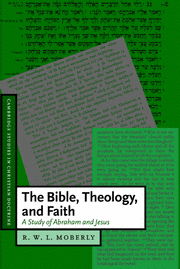Book contents
- Frontmatter
- Contents
- Preface
- 1 The Bible, the question of God, and Christian faith
- 2 Christ as the key to scripture: the journey to Emmaus
- 3 Abraham and God in Genesis 22
- 4 Ancient and modern interpretations of Genesis 22
- 5 Genesis 22 and the hermeneutics of suspicion
- 6 Jesus in Matthew's Gospel as Son of God
- 7 Summary and prospect
- References
- Index of scriptural references
- Index of names
- Index of subjects
2 - Christ as the key to scripture: the journey to Emmaus
Published online by Cambridge University Press: 02 December 2009
- Frontmatter
- Contents
- Preface
- 1 The Bible, the question of God, and Christian faith
- 2 Christ as the key to scripture: the journey to Emmaus
- 3 Abraham and God in Genesis 22
- 4 Ancient and modern interpretations of Genesis 22
- 5 Genesis 22 and the hermeneutics of suspicion
- 6 Jesus in Matthew's Gospel as Son of God
- 7 Summary and prospect
- References
- Index of scriptural references
- Index of names
- Index of subjects
Summary
In the previous chapter we have discussed in general terms some of the considerations applicable to the Christian desire to address the question of God in and through scripture. On the one hand, it was argued that the Christian Bible, as a particular collection of texts, primarily has meaning and coherence in relation to the Christian Church, which affirms that the one God, revealed in Israel's scripture, is known definitively in Jesus Christ. On the other hand, it was argued that without taking that context seriously one lacks the resources for fruitfully engaging with the question of God in and through the biblical text.
It is necessary now to turn to the biblical text itself to give focus to these wider concerns, to try to indicate how they relate to the biblical text. What then might be the basis within the New Testament for interpretation of scripture in the light of the one God as known in Jesus Christ? I will consider only one passage: the encounter of two disciples with the risen Jesus on the road to Emmaus (Lk. 24:13–35). Although many other passages would need to be looked at in any comprehensive study of biblical hermeneutics, and they would qualify and extend the present discussion in significant ways, the exclusive focus here upon this story is deliberate. The Lucan text explicitly raises the issue of the interpretation of scripture (vv. 25–7), and it does so in relation to Christ in such a way that it has been a locus classicus for Christians down the ages.
- Type
- Chapter
- Information
- The Bible, Theology, and FaithA Study of Abraham and Jesus, pp. 45 - 70Publisher: Cambridge University PressPrint publication year: 2000

